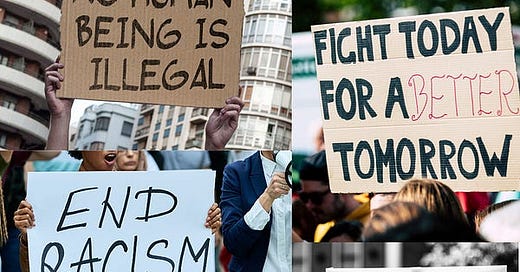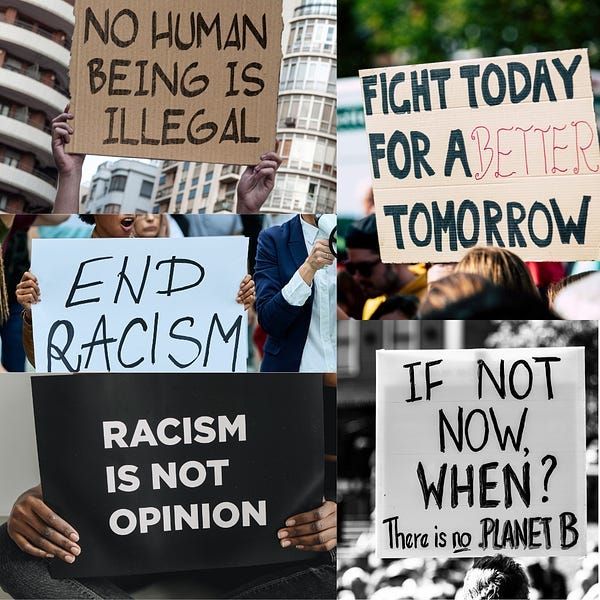Intersectionality: Why You Can, And Should, Care About More Than One Thing
Nothing in the world exists in a vacuum.
If you’re paying attention to political movements around the world, you might have noticed a pattern. Several patterns, probably.
One that jumps out to me is a common criticism from the people observing from the sidelines. When activists step outside of what some people consider to be ‘their cause’, critics can’t wait to pile on.
For example, when Greta Thunberg protested against a windfarm being built on Sami land in Norway, people were confused as to why the climate change activist was upset about wind energy. Wasn’t that her goal? The more windmills the better, right?
Yes! …with one caveat.
It’s important to note that the protest was not about the existence of the windfarm, but rather where it was built. As the protesters said; a greener world is the goal, but not at the expense of indigenous people.
I can see why this might seem confusing on its face. We think of Greta as an environmental activist, and so this action on her part seems very counterintuitive.
But activism is not just about finding one goal and sticking to it at the cost of all others. It’s about a push towards a better world across the board. Besides, if you can name one issue that is completely divorced from all other problems in the world, I’ll call it a miracle.
No issue exists in a vacuum. Every movement crosses paths with every other movement somewhere along the line. It’s one great spiderweb of interlaced concerns.
We call this ‘intersectionality’.
What Is Intersectional Activism?
Here’s a little experiment.
Get a piece of paper and a pencil, write your name in the center, and build yourself a mind map. How could you describe yourself? What are all of the different fragments of your identity that you could list?
For me, I can think of quite a few. I’m a cisgender woman, I’m white, I’m autistic. I’m asexual, I grew up in poverty, and I’m a small business owner. I’m Canadian, I’m a college graduate, I’m in a relationship, and I have chronic illnesses.
It doesn’t stop there, I could go on forever!
None of these individual things define who I am, they do not fully explain the whole of ‘Sam’. But they are little pieces of the puzzle. These pieces of who I am inform how I see the world, and they inform the snap judgements people will likely have upon meeting me for the first time.
People hear ‘autism’, and they have stereotypes in their minds of what that means. Reading that on the page and never having met me, you’ve probably got an image in your head of what ‘autism’ looks like, right?
At the same time, someone might have judgements based on me being a woman, or being white. I might have judgements and assumptions upon meeting a man, or someone wearing certain religious iconography. We all do it.
There’s a lot more to me, and to you, than these little identity boxes. They don’t tell you who I am. But they can tell you what I might have experienced, and they’ll tell you what to think about me.
And further, it’s impossible for me to boil myself down to any one of them.
Every individual’s life experiences are different and unique. The little bits and bobs we pick up along the way, added on to the basis of how we were born, come together to form the worldview that we develop as we grow.
Now, look at your mind map, and fill out each of those little identity blocks. Think of causes and movements that fall under each one, specifically things that might have an affect on your life personally.
I’m autistic, and disability rights are under threat. So I can put that in there as something that affects my life. Oh, and I’m a woman. Women’s rights, that’s a no brainer. I’m Ace, so let’s not forget LGBTQ+ rights too. I grew up poor, and I definitely don’t like seeing kids struggle in poverty, so let’s add that.
Go ahead, fill out your mind map. Put in lots of detail, really think about it. All of the causes you care about, and all of the different movements that have the potential to change your life for the better in some way.
And when you’re done…try and pick the one issue that matters the most to you. I bet it isn’t easy.
Say, if you pick women’s rights as your one thing. Can you imagine never ever sticking up for a homeless person? Completely ignoring it when someone kicks over the cup holding their change, and bullies them for being poor? Would you not care?
Of course you’d care. You have empathy. And besides- plenty of homeless people are women. And there’s the rub.
If you’re fighting for women, then the statistics of women in poverty must matter. If you’re worried about women in poverty, you’ll probably read statistics about access to healthcare and medication. Women’s health being ignored and overlooked, that’s something most of us have experienced. And then you’ll probably stumble on how women of color face even more stigma in healthcare than white women. To say nothing of transgender, or non-binary people who were assigned female at birth.
You’ve gone from women’s rights to racism to the LGBTQ+ in the span of a paragraph. But if you’re going to fight for one, you’ll be fighting all of these battles at the same time, won’t you?
No movement, no cause, no issue in politics can be divorced from any other.
If you fight against poverty, you’ll see that people of color are more likely to be poor. You’ll see that people in poverty are more threatened by climate change catastrophe than wealthy people. You’ll see environmental racism and sacrifice zones everywhere you look.
All of these issues intersect. They all link up. They all matter. When one cause founders, the others feel the strain. And, therefore, everybody fighting for these causes is fighting for the same thing.
Justice for all.
When Causes Intersect
The important thing to keep in mind is that sacrificing one cause for the sake of another will not bring justice. If we try to advance women’s rights by kicking down at the LGBTQ+ community, we ignore all of the women who fall under that umbrella- trans and cis alike.
If we want to fight poverty and institute better social programs, we have to know that climate disasters hit the poor a lot harder than the wealthy, and that people of color are often the worst off. By necessity we have to include provisions for that.
Rather than fighting amongst ourselves about which movement needs the most support at any given moment, we should take a step back and recognize that, in the end, all of these causes are fighting for the same ideal.
Activism is intersectional, because human beings are intersectional. Look at your mind map again. How many different boxes do you see? How many lines cross over one another?
We gain nothing by being at each other’s throats. But by uniting and sharing resources and networking with one another, we build each other up.
If we succeed it will be with unity, not with division.



